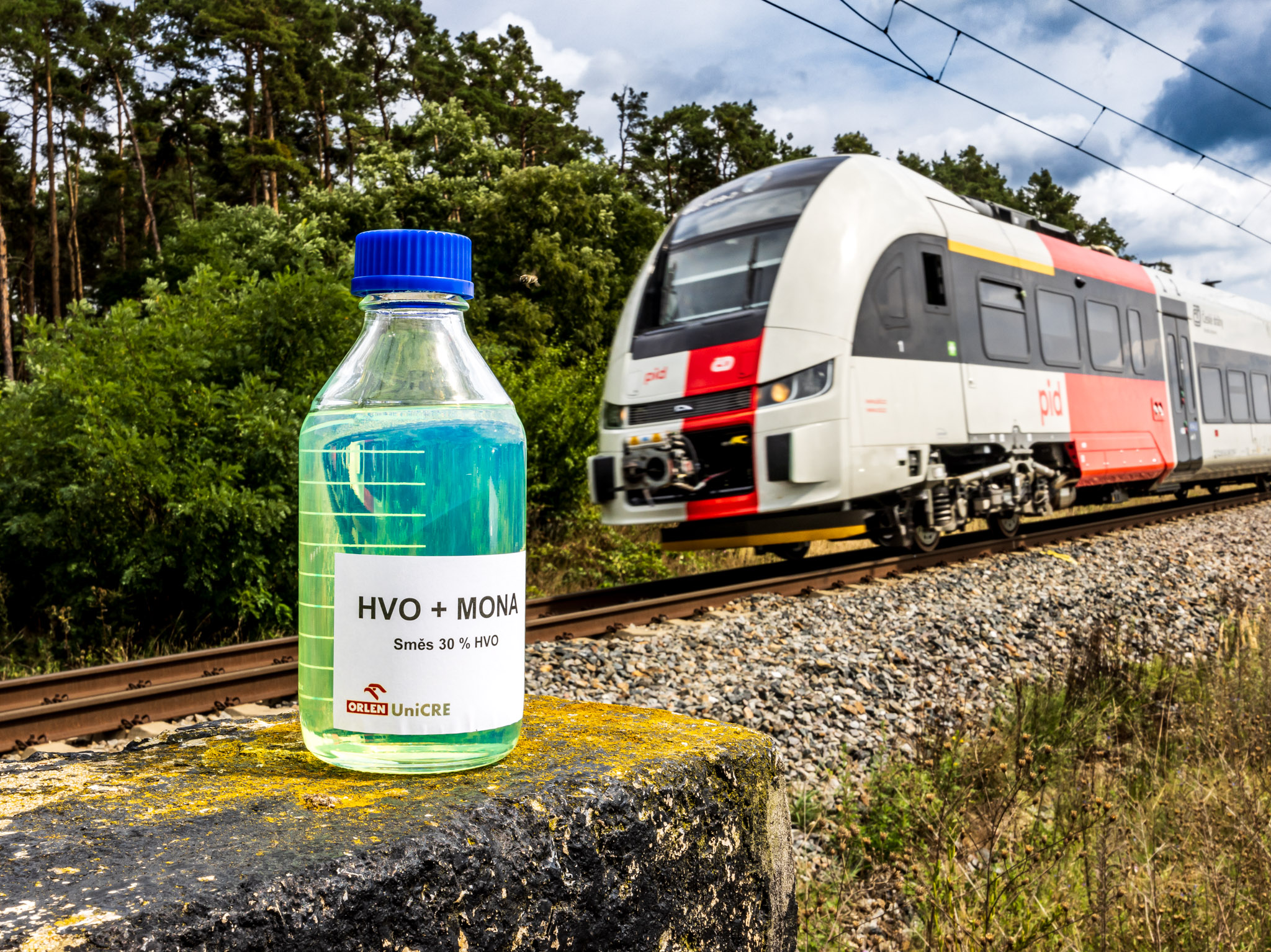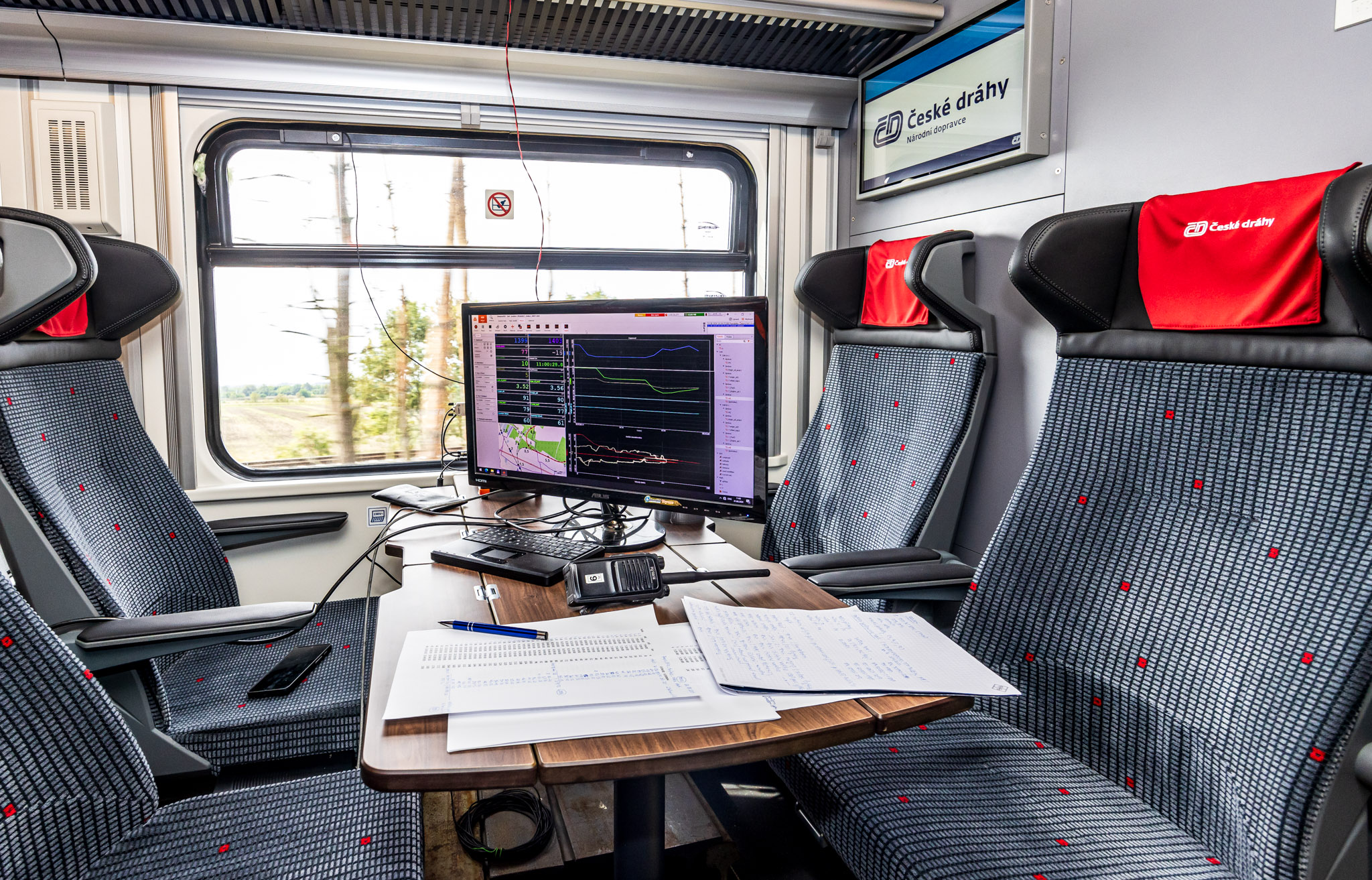České dráhy successfully continues in the testing of diesel oil with an increased content of sustainable biocomponent based on hydrotreated vegetable oil (HVO). Last week, this biofuel was tested in the new RegioFox 847 class diesel multiple units supplied by Pesa at the VUZ Velim Test Centre. The aim of the research project, which is scheduled to run from 2024 to 2025, is to verify the applicability of this biodiesel oil in passenger diesel multiple units and its subsequent deployment in normal operation. The main partner of the project is the ORLEN Unipetrol Group with its subsidiary ORLEN Unipetrol Research and Training Centre, which deals with research and supplies of biofuel. The project also involves the Railway Research Institute (VUZ), the Faculty of Mechanical Engineering of the Czech Technical University and the rolling stock manufacturer “Pesa”.

Within the framework of fulfilment of the strategy of reduction of carbon emissions and the use of renewable resources within the framework of legislative measures of the European Union and of the Czech Republic, the national carrier “České dráhy” and the ORLEN Unipetrol company will launch a project from the beginning of the new year, focused on joint testing of fuel with a sustainable biocomponent in passenger diesel multiple units. The fuel with a proportion of hydrotreated vegetable oil, the so-called “HVO”, will be supplied by the ORLEN Unipetrol company, which is to prepare the individual blends at its production facility situated in Pardubice.
Plan to reduce greenhouse gas emissions by up to tens of percentage points
“This activity fits into the long-term strategy of České dráhy in the area of reduction of emissions and use of renewable resources and is in accordance with the RED III Directive of the European Union, which increased the greenhouse gas savings target from 6% to 14.5% in 2030 compared to 2019. It is also in accordance with the national clean mobility plan of the Ministry of Transport of the Czech Republic,” says Jiří Ješeta, Member of the ČD Board of Directors and Deputy Director General for Passenger Transport.
“Decarbonisation of the Czech industry and transport towards a sustainable future is a common goal of both the state and the corporate sectors. I am glad to see that as large companies setting out the trend we are leading by example and taking particular steps to meet both the EU and national emission reduction targets. For our partner, České dráhy, we have prepared renewable and therefore sustainable fuel blends based on waste fats and vegetable oils, which significantly reduce carbon dioxide emissions,” says Zbigniew Pawłucki, Vice-Chairman of the Board of Directors of the ORLEN Unipetrol Group responsible for research and development.
The prepared fuel mixtures were tested at the VUZ Velim Test Centre
The project is spread over the period 2024 to 2025 and consists of three phases. During the first phase, suitable fuel blends were identified and tested by the ORLEN Unipetrol Group. “For assessment of the possibility of application for decarbonisation of rail transport, we have prepared diesel fuel with 15% and 30% of HVO content and at the same time pure, i.e. 100% HVO. Nearly 80 research samples were worked with during a period of three months. The key parameters investigated were density, low temperature properties, sulphur content, lubricity and emission footprint for both summer and winter blends. Based on the results, we selected and recommended suitable blends of conventional diesel and hydrogenated vegetable oils for testing on the test circuit,” explains Martin Růžička, ORLEN Unipetrol Group's Director for Decarbonisation.

In the second, current, phase of the project, the prepared mixtures were tested in Pesa RegioFox 847 Class diesel multiple units at the Railway Research Institute Test Circuit from 19 August to 23 August. This is because the Rolls-Royce engines of these units are homologated for the use of biofuels, such as blends of diesel and HVO.
“The test in Velim showed that the PESA 847 Class for České dráhy is a regular environment-friendly diesel train. It is equipped not only with a very modern environment-friendly engine of Grade V, but it can also be powered by HVO fuel. This allows České dráhy to reduce its carbon footprint without compromising the train's traction parameters, and also to receive additional government support for the introduction of a real green solution for regional transport,” emphasised Jan Bończyk, Commercial Director for the International Railway Market at PESA Bydgoszcz.
During the rides in different modes, such as starting, braking or maximum speed, the experts from the Railway Research Institute and the Czech Technical University in Prague monitored key parameters, in particular the measurement of the vehicle's engine exhaust gas composition, vehicle performance, vehicle parameters and consumption when using all prepared fuel mixtures, including 100% HVO. “For testing purposes, we used the so-called Small Test Circuit with a length of four kilometres and a permissible speed of 80 – 115 km/h. In order to simulate the conditions of commercial operation as much as possible, we drove over 70 circuits for each type of fuel and loaded the train unit with a weight of fifteen tonnes, which simulates the real passenger load of the vehicle,” says Jaroslav Brabec, Head of the Business Development at the Railway Research Institute, and adds: "The evaluation of emission savings and other parameters will now be followed by the third phase of testing, when the PESA 847 RegioFox units with alternative fuel are to be deployed in commercial operation on a selected railway line in the Central Bohemian region."
Introduction of the HVO fuel
Hydrotreated Vegetable Oil (HVO) is a bio-ingredient processed by refinery processes into a substance corresponding in terms of its composition to the petroleum diesel fraction. The HVO fuel complies with the ČSN EN 15940, Annex II to the Fuel Quality Directive 2009/30/EC or the ASTM D975 US specification. HVO is compatible with mineral diesel oil and can therefore be added at higher blends up to 30% by volume depending on the season. If the vehicle's specifications allow the use of synthetic XTL fuels, it is even possible to run on pure HVO.
HVO produced from different sources varies in terms of quality. The difference is mainly in the method of purification, hydrogen consumption and especially the emission footprint. If the HVO is produced from vegetable oil which has been grown specifically for the purpose of fuel production, all activities related to its production are included in the final emission footprint of the fuel. Nevertheless, significant GHG savings of 60-65% (CO2 equivalent) can be achieved compared to fossil fuel. In the case of the use of used vegetable oils or fats as waste matter, emission savings of up to 90-95% can be achieved compared to petroleum-based fuel.
